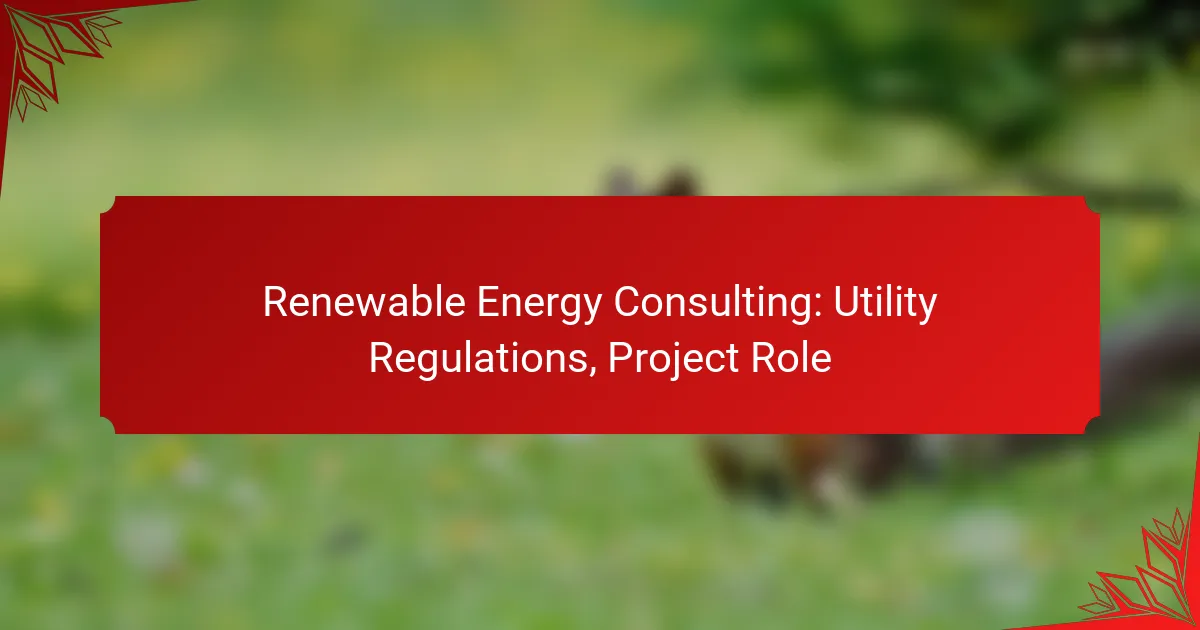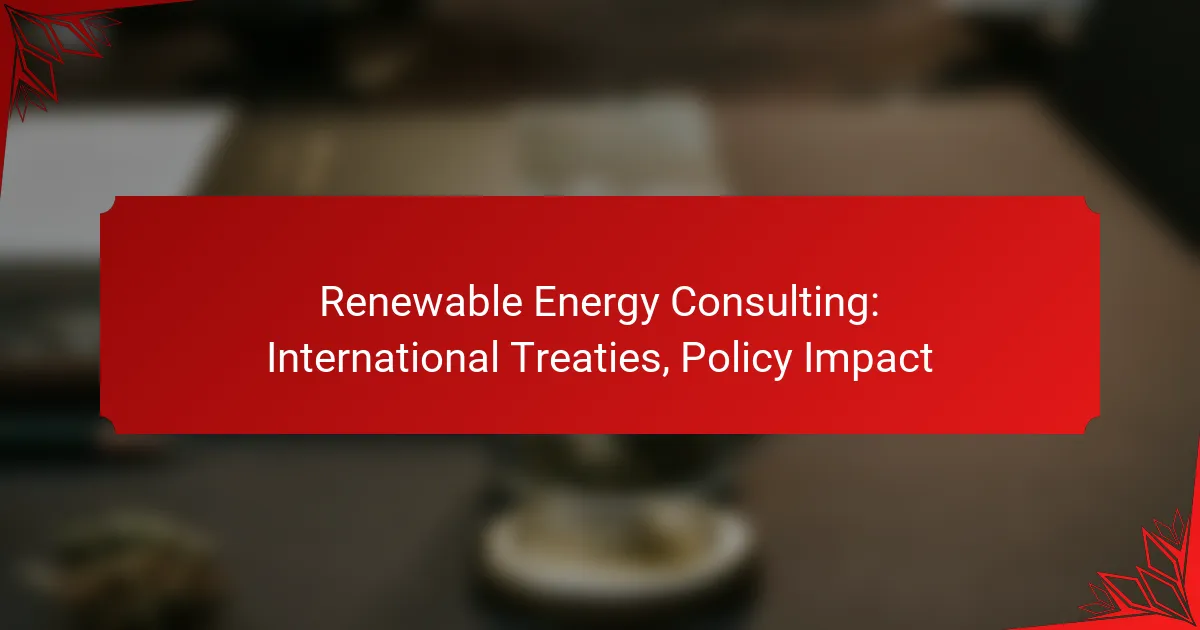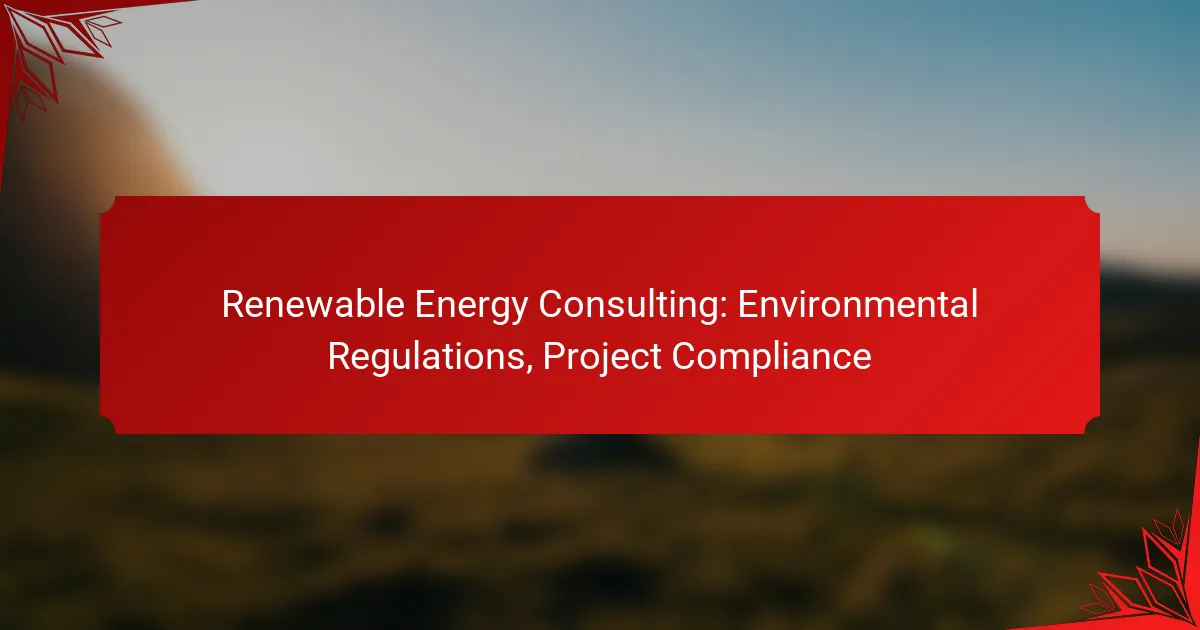Renewable energy consulting plays a crucial role in helping organizations navigate the complex landscape of utility regulations, particularly in states like California. By providing expert guidance on compliance with regulations such as those from the California Public Utilities Commission and Net Energy Metering policies, consultants ensure that renewable energy projects are developed and integrated effectively into the energy grid. Their expertise not only helps avoid costly penalties but also streamlines project execution, making them invaluable partners in the transition to sustainable energy solutions.

What are the key utility regulations for renewable energy in California?
Key utility regulations for renewable energy in California include guidelines from the California Public Utilities Commission (CPUC), Net Energy Metering (NEM) policies, and Renewable Portfolio Standards (RPS). These regulations shape how renewable energy projects are developed, financed, and integrated into the state’s energy grid.
California Public Utilities Commission (CPUC) guidelines
The CPUC establishes rules and regulations that govern the operation of utilities in California, including those related to renewable energy. These guidelines ensure that utilities meet specific targets for renewable energy procurement and maintain reliable service while integrating new technologies.
Developers must navigate CPUC processes to obtain necessary permits and approvals for renewable energy projects. Understanding CPUC’s regulatory framework is crucial for compliance and successful project execution.
Net Energy Metering (NEM) policies
Net Energy Metering (NEM) allows residential and commercial customers with renewable energy systems, like solar panels, to receive credits for excess energy they generate and feed back into the grid. In California, NEM policies are designed to incentivize the adoption of renewable energy by offsetting electricity costs for consumers.
Under current NEM regulations, customers can typically receive credits at the retail rate for the energy they contribute. However, changes to NEM policies may affect compensation rates, so it’s essential for stakeholders to stay informed about potential updates and their implications.
Renewable Portfolio Standards (RPS)
Renewable Portfolio Standards (RPS) mandate that California utilities obtain a certain percentage of their energy from renewable sources. As of recent regulations, the target is set at 60% renewable energy by 2030, with a goal of reaching 100% clean energy by 2045.
Utilities must demonstrate compliance with RPS through their procurement strategies, which can include purchasing renewable energy credits or investing in new renewable projects. Understanding RPS requirements is vital for developers to align their projects with state energy goals and secure necessary funding.

How can renewable energy consulting help with compliance?
Renewable energy consulting aids compliance by providing expertise in navigating complex regulations and ensuring projects meet legal requirements. Consultants guide organizations through the intricacies of local and national laws, helping to avoid costly penalties and streamline project execution.
Expertise in regulatory frameworks
Consultants possess in-depth knowledge of regulatory frameworks governing renewable energy projects, including federal, state, and local laws. They stay updated on changes in legislation, such as the Clean Power Plan or state-specific renewable portfolio standards, which can significantly impact project viability.
By leveraging their expertise, consultants can help businesses understand the implications of regulations on their projects. This includes assessing compliance risks and identifying necessary permits, which can vary widely depending on the project’s location and type.
Assistance with documentation and reporting
Documentation and reporting are critical components of compliance in renewable energy projects. Consultants assist in preparing the necessary paperwork, ensuring that all submissions meet regulatory standards and deadlines. This includes environmental assessments, interconnection agreements, and financial disclosures.
Moreover, consultants can help establish efficient reporting systems to track compliance over time. Regular audits and updates can prevent lapses and ensure that all stakeholders are informed about their obligations, reducing the risk of non-compliance penalties.

What roles do consultants play in renewable energy projects?
Consultants in renewable energy projects serve as expert advisors, guiding stakeholders through the complexities of project development, regulatory compliance, and implementation. Their roles encompass various aspects, including project management, feasibility assessments, and navigating utility regulations.
Project management and oversight
Consultants oversee the entire lifecycle of renewable energy projects, ensuring that timelines, budgets, and quality standards are met. They coordinate between different stakeholders, including developers, contractors, and regulatory bodies, to streamline communication and decision-making.
Effective project management involves setting clear milestones and regularly monitoring progress. Consultants often utilize project management software to track tasks and manage resources efficiently, helping to mitigate risks and avoid common pitfalls such as scope creep or budget overruns.
Feasibility studies and site assessments
Feasibility studies and site assessments are critical steps in determining the viability of a renewable energy project. Consultants evaluate potential sites based on factors such as resource availability, environmental impact, and proximity to existing infrastructure.
During a feasibility study, consultants analyze data on energy production potential, costs, and regulatory requirements. They often conduct site visits and engage with local stakeholders to gather insights, ensuring that the project aligns with community needs and regulatory frameworks.

What are the benefits of hiring a renewable energy consultant?
Hiring a renewable energy consultant offers numerous advantages, including cost savings and access to specialized knowledge. These experts help navigate complex regulations and optimize project designs, ultimately leading to more efficient and successful energy initiatives.
Cost savings through optimized project design
Renewable energy consultants can significantly reduce costs by designing projects that maximize efficiency and minimize waste. They analyze factors such as site selection, technology choices, and system integration to ensure that every aspect of the project is economically viable.
For example, a well-designed solar installation can lower installation costs by 10-20% through optimal panel placement and selection of inverters. Additionally, consultants can identify available incentives and financing options, further enhancing overall savings.
Access to industry connections and resources
Consultants bring valuable industry connections that can facilitate partnerships and collaborations. They often have established relationships with suppliers, contractors, and regulatory bodies, which can streamline project development and implementation.
Moreover, consultants are well-versed in the latest technologies and trends in renewable energy. This knowledge allows them to recommend cutting-edge solutions that can enhance project performance and compliance with local regulations, ensuring a smoother path to success.
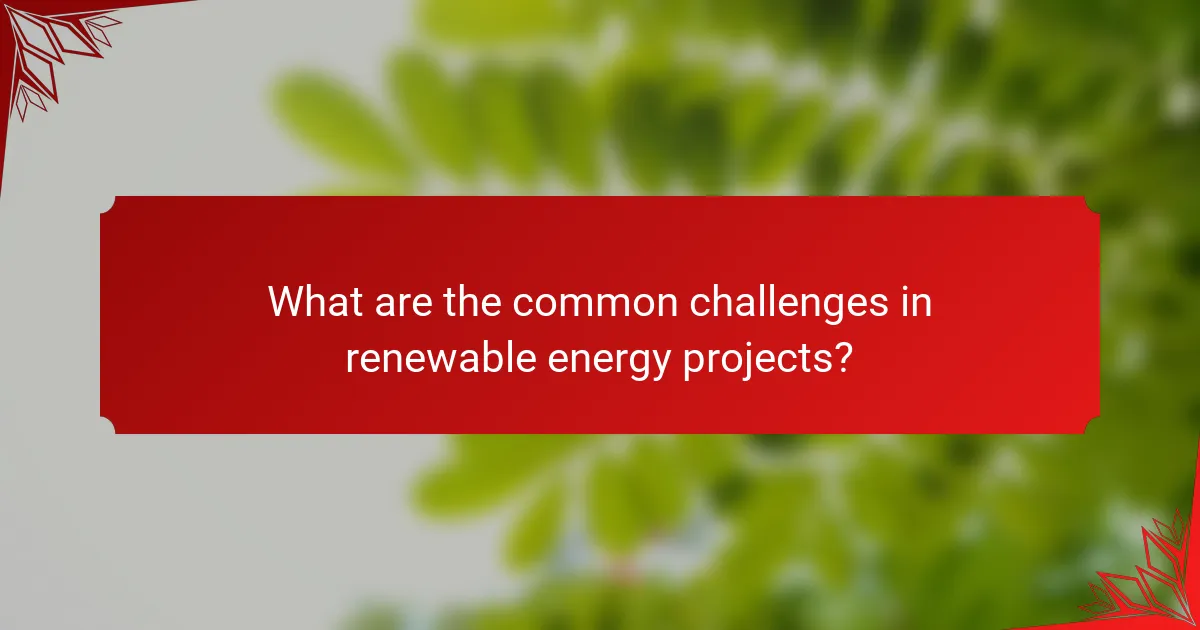
What are the common challenges in renewable energy projects?
Renewable energy projects often face challenges that can impede their progress and success. Key issues include navigating regulatory hurdles, securing financing, and addressing compliance with various standards.
Regulatory hurdles and compliance issues
Regulatory hurdles can significantly delay renewable energy projects. Each region has its own set of regulations that govern energy production, which can include environmental assessments, permitting processes, and grid interconnection requirements.
To navigate these challenges, project developers should engage with local regulatory bodies early in the planning phase. Understanding the specific requirements and timelines can help avoid costly delays and ensure compliance with local laws.
Financing and funding obstacles
Securing financing for renewable energy projects can be complex due to the high upfront costs and perceived risks. Investors often seek projects with clear financial models and stable revenue streams, which can be challenging to demonstrate in emerging markets.
To improve funding prospects, project developers should prepare detailed financial projections and explore various funding sources, including government grants, private equity, and green bonds. Building partnerships with established firms can also enhance credibility and attract investment.

How to choose the right renewable energy consultant?
Choosing the right renewable energy consultant involves assessing their experience, expertise, and client feedback. A well-qualified consultant can significantly impact the success of your project by navigating utility regulations and ensuring compliance.
Evaluate industry experience and expertise
When selecting a renewable energy consultant, prioritize their industry experience and specific expertise in your project type. Look for consultants with a proven track record in similar projects, such as solar, wind, or biomass, as this familiarity can streamline the process.
Consider their knowledge of local regulations and standards, as these can vary widely. A consultant familiar with the regulatory landscape in your region will be better equipped to handle permits and compliance issues efficiently.
Check client testimonials and case studies
Client testimonials and case studies provide valuable insights into a consultant’s effectiveness and reliability. Look for feedback from previous clients that highlights the consultant’s ability to deliver results on time and within budget.
Request case studies that demonstrate successful project outcomes, particularly those that align with your goals. Pay attention to how the consultant addressed challenges and whether they maintained strong communication throughout the project lifecycle.

What are the emerging trends in renewable energy consulting?
Emerging trends in renewable energy consulting include the integration of advanced technologies like AI and data analytics, as well as a heightened focus on sustainability and carbon neutrality. These trends are reshaping how consultants approach projects, ensuring they align with regulatory frameworks and market demands.
Integration of AI and data analytics
The integration of AI and data analytics in renewable energy consulting enhances decision-making processes and project efficiency. By leveraging large datasets, consultants can identify patterns, forecast energy production, and optimize resource allocation.
For example, predictive analytics can help in assessing the viability of solar or wind projects by analyzing historical weather data and energy consumption trends. This allows for more accurate financial modeling and risk assessment, leading to better investment decisions.
Focus on sustainability and carbon neutrality
A strong emphasis on sustainability and carbon neutrality is driving the renewable energy consulting sector. Consultants are increasingly tasked with helping clients not only meet regulatory requirements but also achieve ambitious sustainability goals.
Strategies may include recommending energy-efficient technologies, facilitating carbon offset programs, and developing comprehensive sustainability plans. For instance, companies may aim for net-zero emissions by 2030, prompting consultants to devise actionable roadmaps that align with this target.
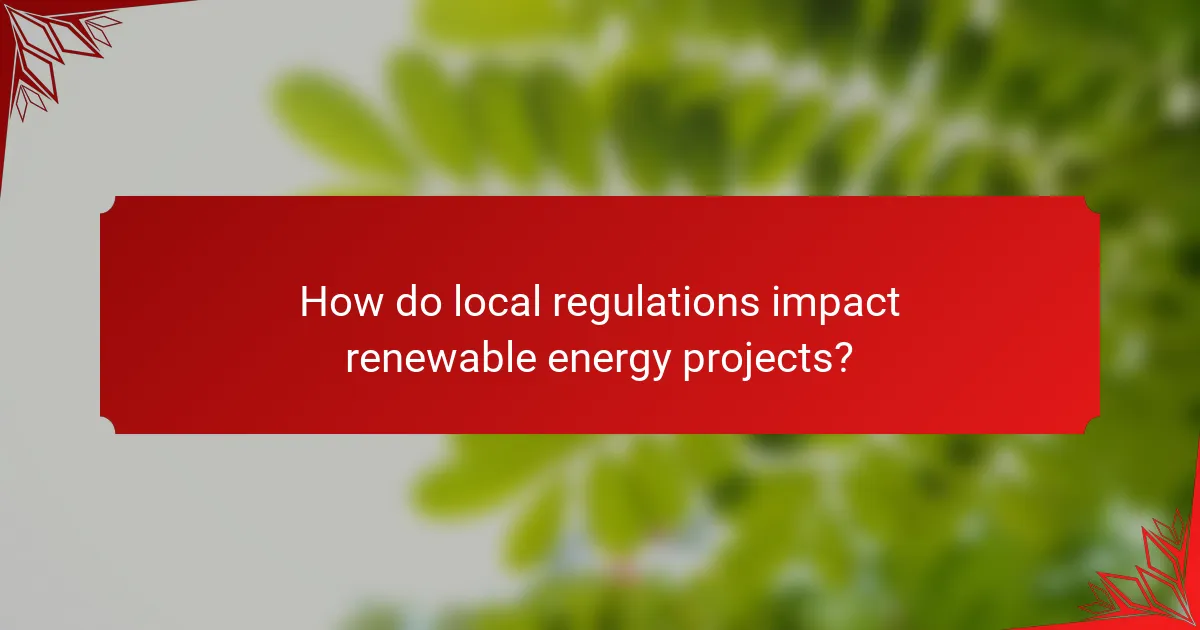
How do local regulations impact renewable energy projects?
Local regulations significantly influence renewable energy projects by dictating compliance requirements, permitting processes, and incentives. Understanding these regulations is crucial for project success, as they can vary widely between jurisdictions and affect project feasibility and costs.
Variability in state-specific policies
State-specific policies can vary dramatically, impacting aspects such as net metering, renewable portfolio standards, and interconnection rules. For example, some states may offer generous tax credits or rebates for solar installations, while others may impose stricter permitting requirements that can delay project timelines.
When planning a renewable energy project, it’s essential to research the local regulations in your state. This includes understanding the specific incentives available, potential obstacles, and the overall regulatory environment. Engaging with local authorities early in the process can help identify any unique requirements or opportunities.
To navigate these variations effectively, consider creating a checklist of key regulations and incentives for your state. This can include items like application deadlines, required documentation, and any local utility policies that may affect your project. Being proactive in understanding these factors can save time and resources in the long run.
